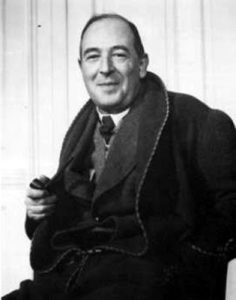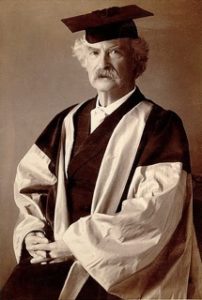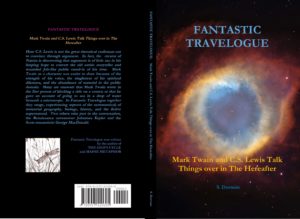Article by S. Dorman
Is there a right—or wrong—way to fictionalize C.S. Lewis? I cannot say the question was considered when I began tearing into the materials for Fantastic Travelogue, a speculative fiction in which C.S. Lewis and Mark Twain talk things over in the hereafter.
Fictionalizing questions that I came to later—in order to write this piece—included, 1) Should mere dialogue be considered—conversations, arguments without concrete setting or activity? 2) Should Lewis’s most recognized aspect be neglected, namely that of the astute and determined debater so marked in person and in his apologetics and criticism? 3) Does a creative writer’s liberty include license to use the names, likenesses, and settings from the real world to sub-create characters that may be somewhat unlike the real people and places? And 4) is fictionalizing Lewis, or any real person, a form of fan fiction?
 How can a writer with no legal access to quotation synthesize a fictional Lewis? If the would-be re-creator is no debater of any confidence, wit, acumen, and depth of knowledge, —how would he or she make a good C.S. Lewis? There are authors with works in the public domain that might reasonably fit into the scheme of such fictionalizing. Mark Twain and George MacDonald being two examples used in Fantastic Travelogue. One might not scruple to quote them verbatim. Lewis might legally have paraphrased for his storybook portrait of George MacDonald in The Great Divorce. He chose to sub-create dialogue between himself and his imagined mentor. With one objection, there can be no doubt that Lewis knew George MacDonald, from his works, well enough to do this.
How can a writer with no legal access to quotation synthesize a fictional Lewis? If the would-be re-creator is no debater of any confidence, wit, acumen, and depth of knowledge, —how would he or she make a good C.S. Lewis? There are authors with works in the public domain that might reasonably fit into the scheme of such fictionalizing. Mark Twain and George MacDonald being two examples used in Fantastic Travelogue. One might not scruple to quote them verbatim. Lewis might legally have paraphrased for his storybook portrait of George MacDonald in The Great Divorce. He chose to sub-create dialogue between himself and his imagined mentor. With one objection, there can be no doubt that Lewis knew George MacDonald, from his works, well enough to do this.
We may have a dialogue in the formal sense of the word, but do we have a story if what we are given is a CSL arguing with disembodied others in a nether-world of mist — or even in a world of light? Should vindication through argument be the sole purpose of both the work and the sub-creation of CSL’s character? A narrative whose purpose is argument and debate is not the story of The Great Divorce — where rhetoric is but a part of the whole. TGD gives a solid land with solid glowing description, enhancing our imaginations as we read. Forming a character who but debates in a debatable “land” may not be the right setting in which to fictionalize C.S. Lewis.
Another possible wrong way? Be careless with the content of a man’s moral or religious character. There must be leeway for the writer’s own imagination in his or her making, but to change appreciably the beliefs of the character would be to subvert it. Some authors, scholars and critics, would feel that to convert a dead author is not good characterization. Is this what CSL did with his fictionalized George MacDonald (as William Gray suggests)? Universalist that GMD was, would he have left one soul outside the Kingdom of Heaven? (The Great Divorce 118.) A discerning knowledgeable reader will judge if I transgress my rule about conversion of characters in Fantastic Travelogue.
 Two ways perhaps not “wrong” but not strictly “right” might be to depict a Lewis who was not as astute and argumentative as the original, or a Lewis willing to forego debate for a better purpose. Lewis has written, about Gulliver and Alice, that a too realistic presentation would have destroyed their stories. Being untrue in characterization can destroy the illusion, but character can be simplified with satisfaction. (On Stories 61.) This is the way CSL fictionalized himself in Perelandra and The Great Divorce. Peter Schakel, in Reason and Imagination in CS Lewis, suggests that we may read Orual the Queen of Glome as self-fictionalizing in Till We Have Faces. Here we see the character disliking the view of herself in the mirror. The suppression of self-contemplation is a theme of the story, and the mirror is symbolic of this. There a mirror is part of the nightmare scenario. The bus driver’s rearview mirror in Divorce, in which the character Lewis views himself, is not used as a realist would use it: to access psychological portraiture. Instead Lewis, the first-person narrator, sees his reflection, and allows that moment to echo in our imaginations producing its nonverbal insight, before the narrative moves on.
Two ways perhaps not “wrong” but not strictly “right” might be to depict a Lewis who was not as astute and argumentative as the original, or a Lewis willing to forego debate for a better purpose. Lewis has written, about Gulliver and Alice, that a too realistic presentation would have destroyed their stories. Being untrue in characterization can destroy the illusion, but character can be simplified with satisfaction. (On Stories 61.) This is the way CSL fictionalized himself in Perelandra and The Great Divorce. Peter Schakel, in Reason and Imagination in CS Lewis, suggests that we may read Orual the Queen of Glome as self-fictionalizing in Till We Have Faces. Here we see the character disliking the view of herself in the mirror. The suppression of self-contemplation is a theme of the story, and the mirror is symbolic of this. There a mirror is part of the nightmare scenario. The bus driver’s rearview mirror in Divorce, in which the character Lewis views himself, is not used as a realist would use it: to access psychological portraiture. Instead Lewis, the first-person narrator, sees his reflection, and allows that moment to echo in our imaginations producing its nonverbal insight, before the narrative moves on.
Is the chief characteristic of Lewis’s self fictions wonderment? Bemused and troublous confusion in life’s events and circumstance? He points toward a subject of wonder, of consideration and awe. Consider the opening sentence of Perelandra. Immediately the first-person narrator deflects from himself, toward both his readers (perhaps figured as those on the platform) and to Ransom, who, it turns out, is at center stage in the story.
So Lewis writes himself. But is it fair for us would-be fictionalizers to do likewise? And is fictionalizing Lewis a form of fan fiction? Ethically, can we permit ourselves to boil this worthy poor man down to one element of character, leaving all his other considerable charms and attributes out of it — or perhaps merely suggesting them from time to time?
After all, isn’t he best known in this life as a wise man, a soaring intellect of incisive insight; rational; harmonizing his great qualities in a variegated multitude of books? Why then choose the one quality that makes him seem so unlike all this? The quality that makes him something of a child.
If it is so done, it must be because it is worthy to be child, to wonder, suffer confusion, long for both adventure and the fantastic. He must be the childlike Lewis because that may be the closest this maker can come to sub-creating the “ordinary” Lewis. It’s right to give him a fantastic setting, and it is also right to give him an anchoring setting. Because his was an imagination ready for phantasmagoria, ready for historic Western literary culture, ready for theological concerns, it is right to give him fictionalized companions also anchored in this Western cultural paradigm. But all must be plausibly crafted within the given “world” of the story.
I’m discussing right and wrong ways to fictionalize C.S. Lewis. Assumptions of craft have been considered, and the dialog-in-isolation form rejected. Ideas do not a story make, nor do they make an imaginative character. In this piece, C.S. Lewis’s self-subcreation points the right way to fictionalize him —as an every-soul who is visiting in a strange land. We considered falsification, discovering that, in order to be believed, Lewis’s own beliefs and moral content would best be preserved.
Finally, is it ethical to fictionalize a person made by God in primary creation — does an artist have any such right? Is fictionalizing any real famous person, a form of fan fiction? Perhaps: if his or her crafting is good enough to coordinate the elements of story inclusive of such characterization. But there is no license to defame, distort, or otherwise abuse a real person. One who would carefully make a portrait does well to have access to public domain primary verbal materials and personal history. In this way Mark Twain might be more easily drawn than Lewis. On the other hand, even with such materials, George MacDonald, would be nearly impossible to fictionalize well—though his books, verbal thoughts, and the reminiscence of him pile high. I’m not certain his person was as harsh, nay stern, as his narrative voice. I will not argue it here, but George MacDonald simply cannot be successfully done. Not by me surely, and perhaps not by C.S. Lewis.
Or maybe you can?
(This piece is adapted from an essay appearing in Mythprint, No. 341, bulletin of the Mythopoeic Society. It serves as the intro to one edition of Fantastic Travelogue, and is also published in a nonfiction companion book of related essays. One of its essays, “The Cosmology of Error,” was published in Extrapolation, Spring 2007. I hope to fictionalize GK Chesterton and Christopher Hitchens in dialogue and adventures. Will one of these convert the other, I wonder?.)
Visit S. Dorman’s Author Page.
Works cited or consulted:
Gray, William. “Pullman, Lewis, MacDonald, and the Anxiety of Influence.” Mythlore 25.3/4.
Lewis, C. S.. The Great Divorce. New York: Macmillan, Touchstone Edition, 1996.
—. On Stories: and Other Essays on Literature. New York: Harcourt Brace & Co., 1982.
—. Perelandra: A Novel. New York: Macmillan, 1965.
—. Till We Have Faces: A Myth Retold. New York: Harcourt Brace Jovanovich, 1980.
Schakel, Peter J.. Reason and Imagination in C. S. Lewis: A Study of Till We Have Faces. Grand Rapids, Michigan: William B. Eerdmans.



I have somehow not begun to catch up with fiction by other hands than his own, featuring Lewis, but enjoy brooding over his self-fictionalizations. Your writing of “a Lewis who was not as astute and argumentative as the original”, and noting “but character can be simplified with satisfaction”, made me think of (at least some of) Chaucer’s self-fictionalizations. The very astonishing one of his ‘Hous of Fame’ has in common with The Great Divorce that it is depicting him for the most part in an account of a dream-vision. I don’t know enough about it, but down the ages I understand some have treated Dante’s Comedy (with which ‘The Hous of Fame’ may be consciously playing, in part) as a dream-vision, too. That seems to give all sorts of freedoms, in any case. Lewis’s MacDonald is not MacDonald simply, but Lewis’s-dream(-vision) MacDonald, for instance. I haven’t paused to look it up, but recall Tolkien objecting to Milne giving a ‘dream’ frame to his dramatization of some of Kenneth Grahame’s matter, in Toad of Toad Hall. But I wonder how far a sort of possibility of that exists, even when not an explicit feature of a ‘telling’ – as with those interpretations of Dante. Are Peter Kreeft’s ‘hereafter’ (early among the still-unread Lewis fictionalizations I’ve heard of), and your “Hereafter” here, proof against someone taking them to be ‘dream-visions’, with all their inherent qualifications? (I seem to recall a fascinating discussion by Hope Emily Allen in her edition of The Book of Margery Kempe of visionary experience and its accounts.)
There are three sections to this science fiction (Fantastic Travelogue), each could be classed as dream-vision, I guess. Kepler, also depicted in FT, played with dream-vision, in Somnium (some say the first SF ever). His was also perhaps a kind of self-fiction. Dream-vision is a helpful, good device for a writer!
I wonder if we’ll ever find Tolkien not objecting to much. 🙂
David, thanks so much!
Like that middle name. It was my dad’s as well.
—Susan
Thanks!
I’ve read Cyrano’s L’Autre monde: Les États et empires de la Lune. Les États et empires du Soleil in translation, and listened to translations of Lucian thanks to LibriVox.org, but have never managed to catch up with Kepler in any form – but you’ve given me a nudge, and I am delighted to find Wikipedia links to someone’s M.A. thesis online including a translation! So, before long… (I hope…)
Lovely! It’s been skipping down the generations for a while, now, in our family – and I was delighted to get to play Captain Fluellen in Henry V once.
Thanks again! If I recall rightly I read a translated Somnium for my thesis in humanities (in a past decade some when). I recall thinking Lewis got his mode of transport for Perelandra there. It’s probably well known to Lewis scholars. (Of which I am not one!)
That was a delightful use of the Lewis household chicken(s) in a piece of fan fiction of yours I read (once upon a time in a Signum contest to which I also submitted).